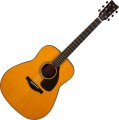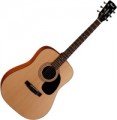Body
Guitar body construction, including both soundboards and sides. For these parts, two main types of wood can be used: solid (solid) and puff (better known as plywood). Plywood is cheaper than solid wood, but loses to it in terms of acoustic properties. Therefore, the type of deck in the characteristics is usually indicated only if solid wood is present in it. However, if data on the deck is not given, this does not mean that the instrument is made entirely of plywood; in addition, it is worth noting that some types of plywood come close to solid wood in terms of acoustic properties. Therefore, without having information on the deck design, it makes sense to focus primarily on the price category of the instrument.
Options for a solid tree can be as follows:
—
One piece top. The English name is also used — solid top. We are talking about instruments in which only the upper deck is made of solid wood — the rest of the body is made of plywood. This option is a good compromise between sound quality and affordable price, it is quite popular in mid-range guitars.
—
Completely whole. A body in which all parts are made of solid wood — both decks and sides. This is the most advanced option in terms of acoustics — especially since some types of wood even improve over time (provided that it is solid wood). However, a completely one-piece body is quite expensive, so this option is found
...mainly in high-end professional instruments.Bridge
The material from which the bridge (string holder) of the guitar is made is a device with which the strings are attached to the top deck.
Theoretically, the colour of the sound of an instrument depends on the characteristics of all its details. However, in the case of the bridge, this influence is so insignificant that the data on the material in this case are more of general reference and advertising than of real practical value. The variety of such materials is quite large; among the most common are
rosewood,
mongoy and
ebony.
Scale
Scale length of the guitar. The scale in this case is the working part of the string, in other words, the distance from the saddle (on the headstock) to the saddle (on the bridge). In most acoustic and similar guitars, the scale is set during production and is unchanged. Without going into technical details, we can say that the value of this parameter is generally a reference: it allows you to some extent estimate the overall dimensions of the instrument, as well as the size of the frets (the longer the scale, the larger the size of the frets, regardless of their number). However, there is also a practical application: with an adjustable anchor (see above), the scale length data can be useful in the tuning process.
Fretboard
The fingerboard material is the surface directly under the strings. Now the most commonly used materials are:
rosewood,
mongoy and
ebony. For the value of this parameter, see p. "Top deck".
Case
The presence of a
case or cover in the tool delivery kit (what exactly is included in the kit must be specified in each case separately).
A case is called a case made of hard materials, a case is made of soft materials, this is the main difference between these types of accessories. Otherwise, they are similar: both the case and the cover are provided primarily for the convenience of transporting the tool. To do this, the design provides for handles, shoulder straps and other devices that facilitate carrying, as well as compartments for additional accessories (replaceable strings, tuners, etc.). However, it is desirable to store the tool in a case or case — to protect it from dust and other adverse factors.
The “native” case/case is good because it optimally fits a specific guitar model and is immediately sold with it, saving the owner from unnecessary searches. On the other hand, manufacturers often include the simplest types of cases in the kit, with minimal additional features and a very limited degree of protection. This is especially true for cases that can be made of thin material and are only suitable for short-distance movements in warm weather without rain. Therefore, sometimes it makes more sense to buy a case separately.

